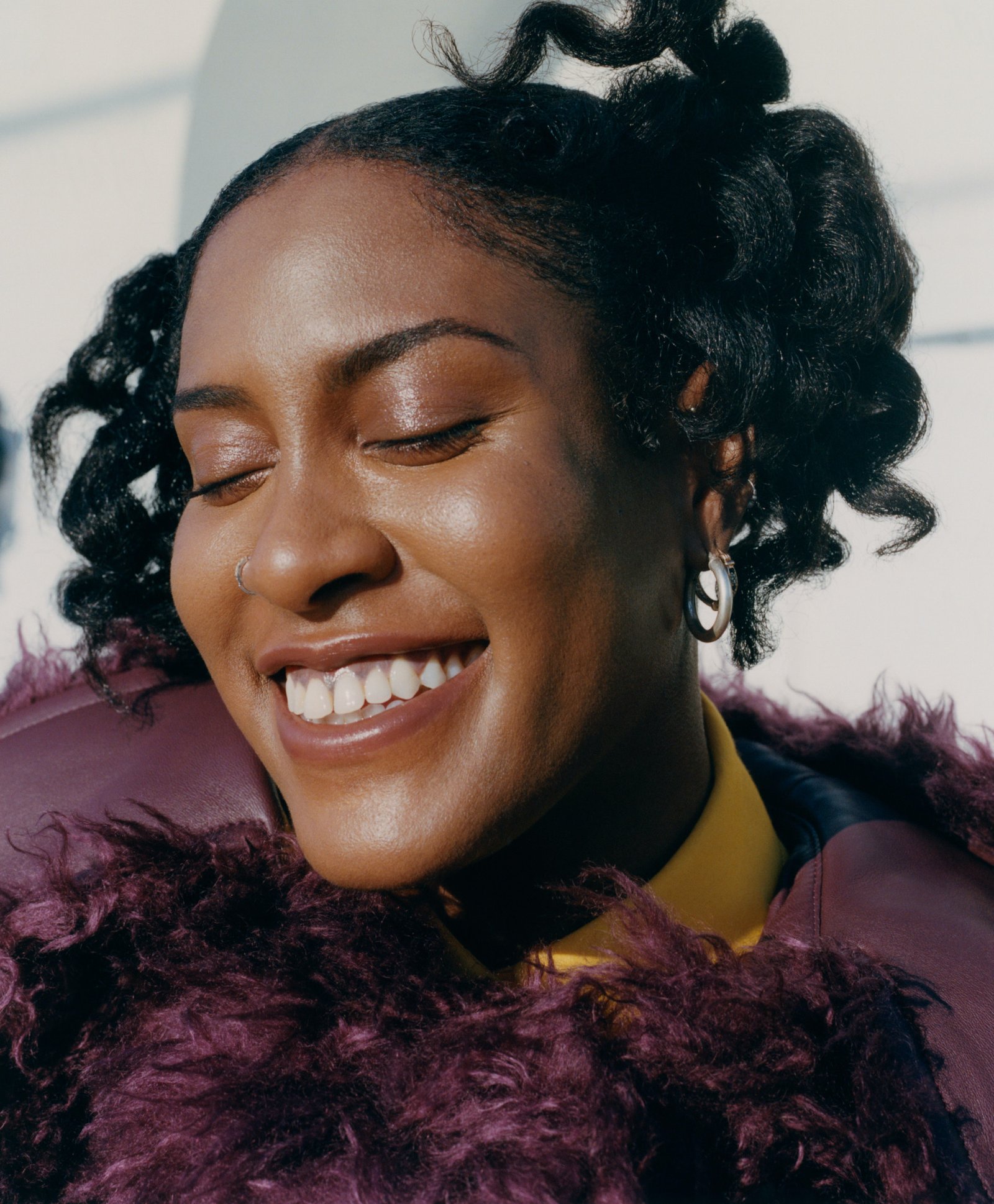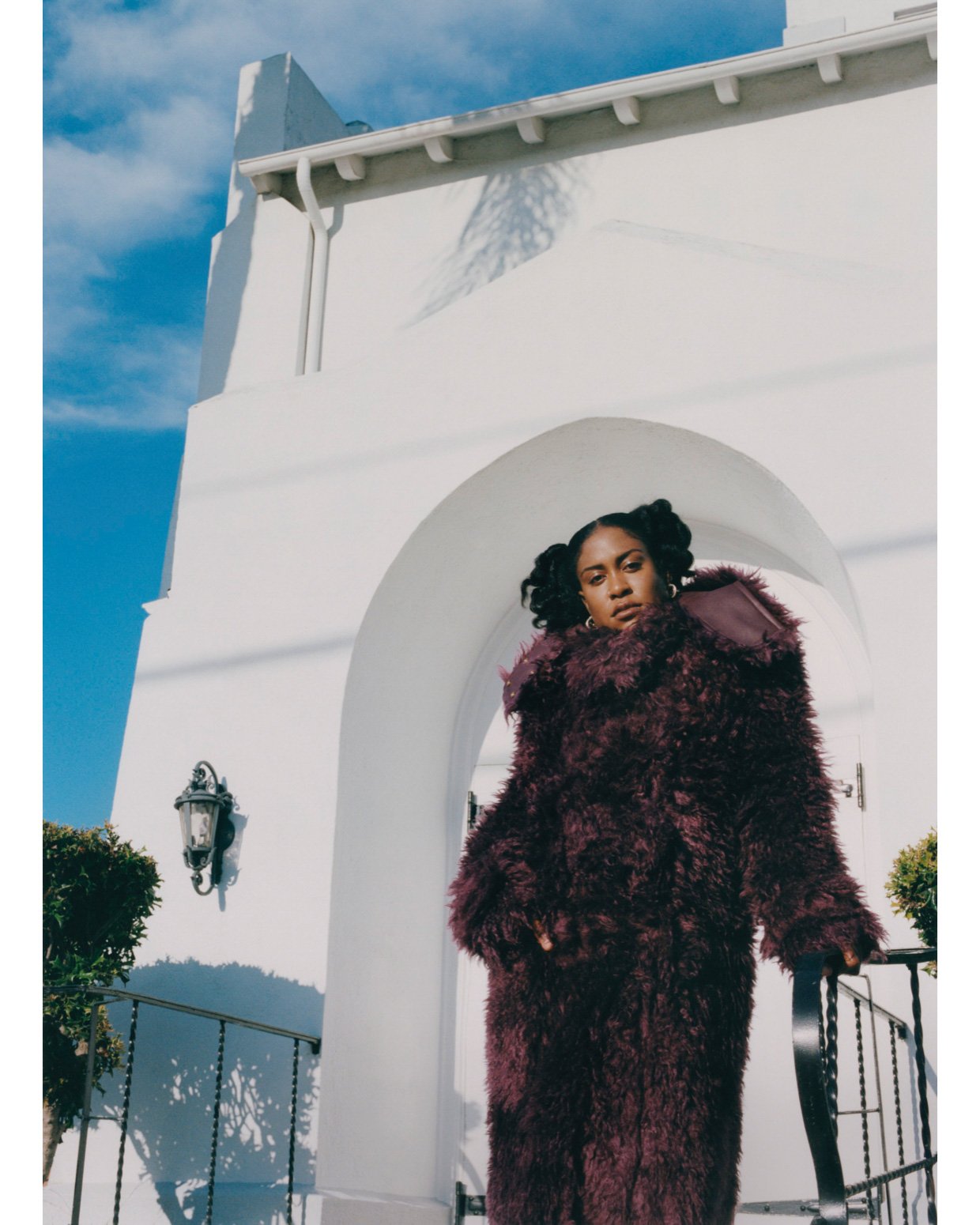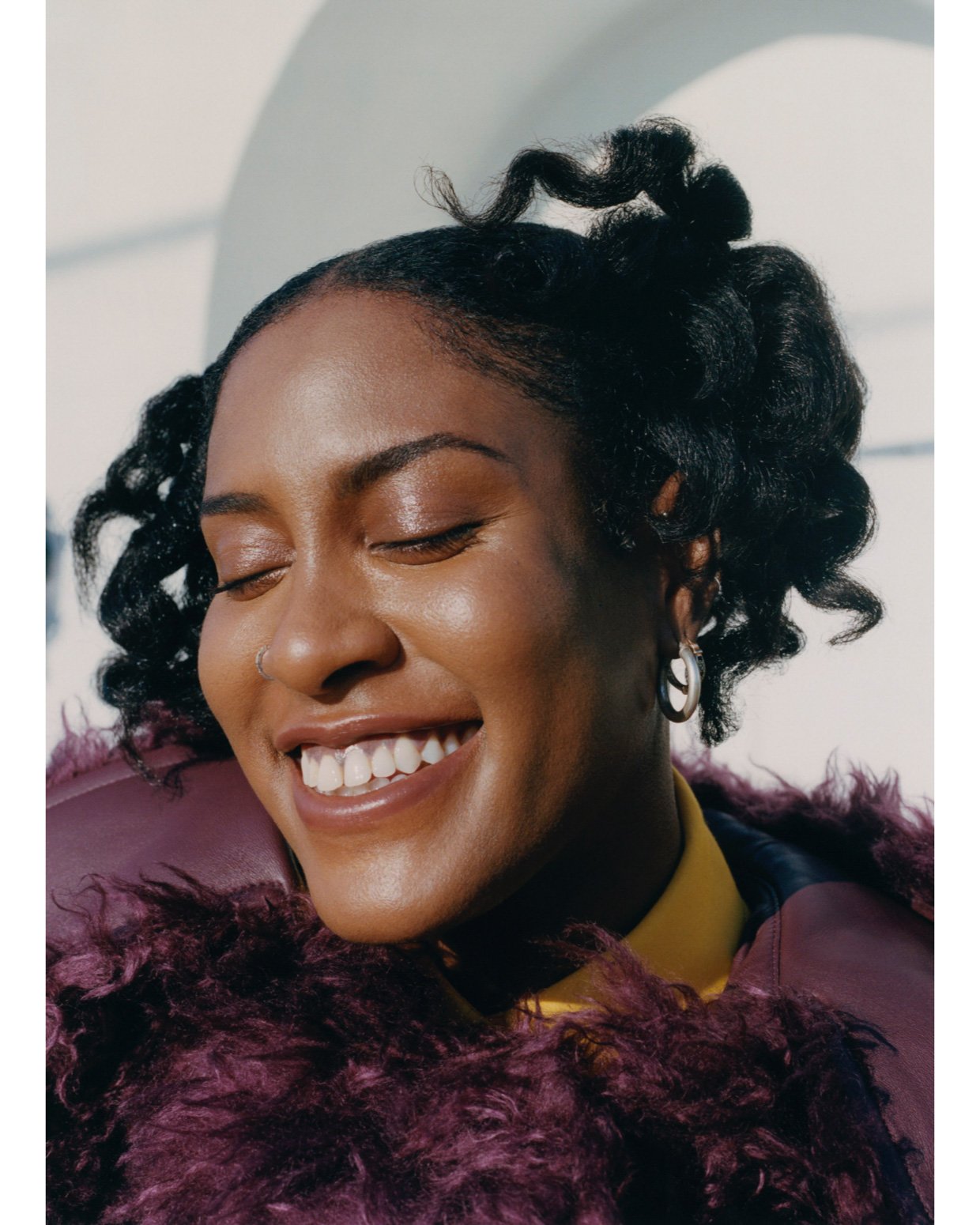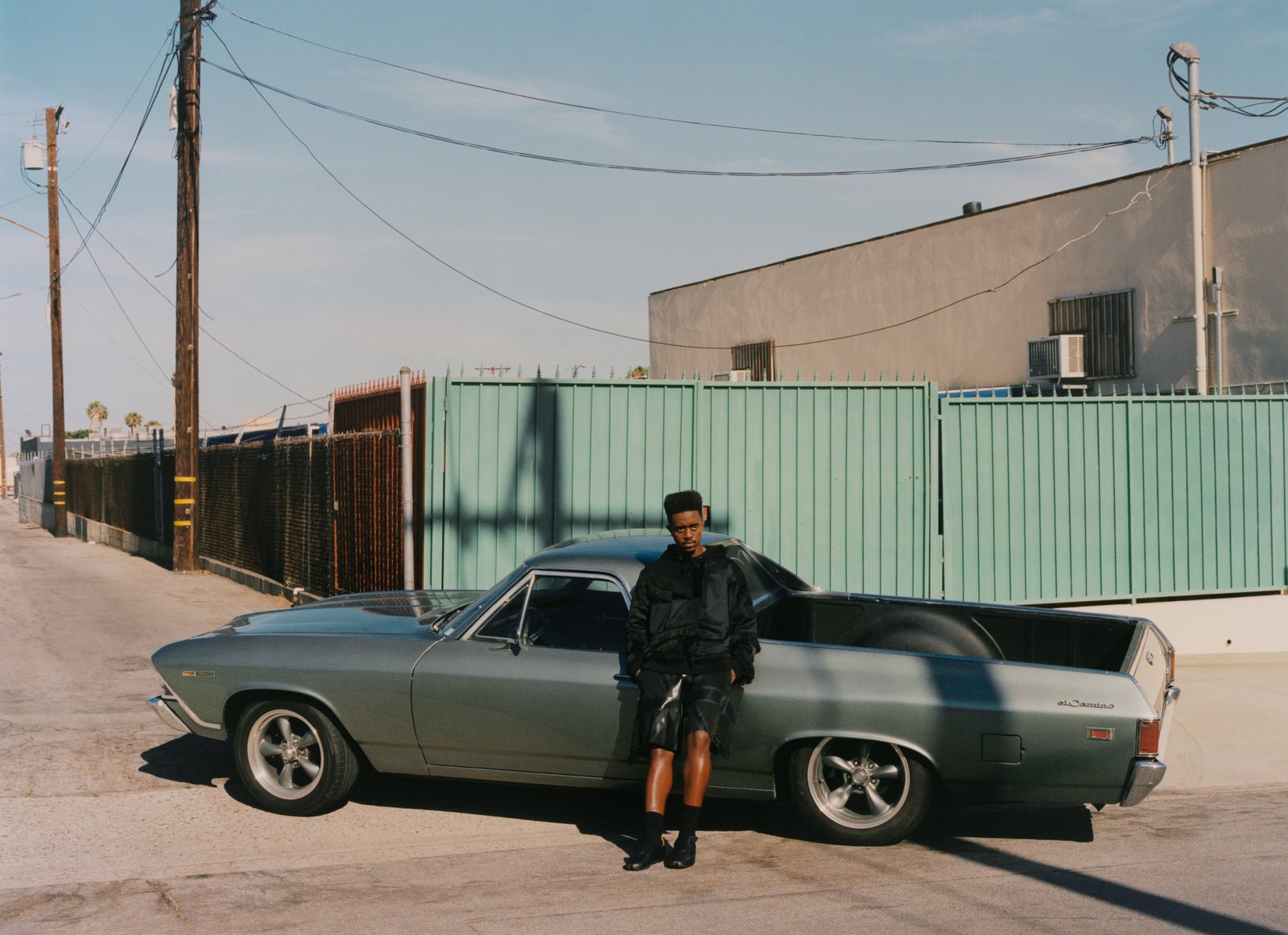Mandy Harris Williams cares through critique
Artist, educator, and voice of her generation. Mandy Harris Williams is a thought-leader we should all be listening to.
Made in partnership with Burberry. This story originally appears in Justsmile Issue 2, Together in the Fold.
Photography Barrington Darius
Styling Tamia Mathis
Text Yves B. Golden

Mandy wears coat and shirt BURBERRY.
‘Critique is an essential form of care, and it is an especially relevant one in the context of the information age,’ Mandy Harris Williams writes in her essay ‘Critique as Care,’ a commissioned work for the Fox Wedding Journal on HMAN.love, that went viral for its timely appraisal of the COVID-19/Black Lives Matter self-care economy. By aligning critique with care, Mandy proposes that the work at hand is easier said than done. Screenshots of the essay were isolated and distributed across platforms in dialogue with infographics aimed at prioritizing rest and complacency; one of many examples of her relevance outside of her notable work adjusting the visual landscape of Instagram and beyond with #BROWNUPYOURFEED. Mandy insists that the work begins with optics and takes root in our daily practices.
For Mandy and the fore-members of the literati, transforming our society starts with a willingness to engage with the public, tenderly and firmly, despite systematic suppression of critical voices. One of many objectives is holding a mirror to the public while existing in the public — a balancing act requiring tact, agility, persistence and ever-expanding imagination. ‘I just wanna see dark skin girls come up in the spaces their ancestors built just for them,’ she wrote on Twitter last autumn. Mandy’s success on social media is a testament to her uncompromising vision and unbudgeted enthusiasm for Black femme liberation. She is constantly cited and sub-tweeted for saying what a lot of us think and what very few of us practice.
The attention garnered from this level of engagement and the amplification of this public attention has always been impacted by the laws of spectacle and spectator; what better way can one propose radical alternatives than living in them publicly? Thus, the ‘glamorous intellectual’ pools focus to infuse the necessary urgency, lacking in otherwise performative or superficial Leftist dialogues and forums. Glamour as well as the trappings of glamour and celebrity can be/have been tools likened to the sugar that sweetens medicine.

Mandy wears coat BURBERRY. Earrings Mandy’s own (worn throughout).
Mandy has some answers in her upcoming film Couture Critiques; a seamless blend of 90’s fashion show aesthetics — lush, decadent and exuberant — and avant-garde, afro-futurist cinema nods (the film premieres on dis.art in October, and at the Biennale de l’Image en Mouvement, at the Centre d’Art Contemporain Genève.) While joining her on set and witnessing the breadth of her utopia in real time, I discovered that Mandy’s medium is as much critique as it is time itself.
Mandy references ‘attentionality’ several times throughout our discussion over tea, gesturing towards the critique of the spectacle – that delicate dance which permeates Mandy’s work: ‘In an information age, it’s not just about what is accessible, but what people are paying attention to,’ she remarks. Who are we looking at, listening to and uplifting and why them over others? What makes someone's work, thought, face or body worth more than another’s? Here Mandy’s work around intellectualism mirrors her work on desirability privilege: ‘If I had it my way’ she writes on Instagram ‘I’d spend more of my time performing and in public, and well-supported at that. Did you know that “lookism” (under racial capitalism) pervades opportunity structures in art, music, Hollywood, academia, non-profits, and publishing too? Be real, do you notice your local scenes consistently rallying around lighter skinned femmes with more gusto than their darker peers? Do you notice that some people are more easily dismissed, minimized, ostracized or excluded? Do you notice some people can’t get a break?’ The issues being highlighted here are not new or trendy; the Black experience is beyond trend insofar as it is not constructed of capitalism nor white existential thought. Relaying conditions we are all too familiar with, and yet evade, highlights that there are decisions being made and opportunities resources being mismanaged. She continues, ‘ ... you can’t help but notice that dark skinned femmes especially are subject to harsher criticisms about their appearance, and that these criticisms bear fruit in lived/loved experiences.’
“When you’re calling attention to how things can be improved, or even perfected, tough s**t, that means people will have to change the way they live, the way they engage ... it’s not the easiest pill for people to swallow, and it doesn’t make you the most popular girl about town”
Practicing and applying intentional, deliberate discomfort, as per Edward W. Said’s definition of the intellectual, appears throughout Mandy’s practice. He says, in his work Representations of the Intellectual (1994) ‘ ... this role has an edge to it, and cannot be played without a sense of being someone whose place it is publicly to raise embarrassing questions, to congruent orthodoxy and dogma (rather than to produce them), to be someone who cannot easily be co-opted by governments or corporations, and whose raison d’etre is to represent all those people and issues that are routinely forgotten or swept under the rug.’ Said’s intellectual works with and through the discomfort, separating the intellectual from a person with mutable agendas and discrepancies of action. This intellectual puts the mission first, plunging their hands in the soil for overlooked truths.
I think an intellectual is only as good as their performance of the thought ... for better or worse. When you’re calling attention to how things can be improved, or even perfected, tough shit, that means people will have to change the way they live, the way they engage ... it’s not the easiest pill for people to swallow and it doesn’t make you the most popular girl about town' Mandy says. She laughs cheekily and throws her hair back with her ombre acrylic nails, 'although I am pretty popular.
Citing Edward Said’s definition of the intellectual helps ground the process and roles at play within this archetype while also providing directionality for the praxis and experience, from intelligence to knowledge, from hope to faith. Attaching or aligning oneself with the lineage of past and present, critical thinkers and enthusiastic critics creates some assurance that there is in fact a future in motion worth tuning into and participating in. Thus, the call to action that threads these cultural workers together.
Spectacle and performative intellectualism are closely tethered in today’s social justice context. Couture Critiques aims to join these ideas in earnest and to provide a model wherein the hierarchies that govern our taste and drive to transform our society to prioritize dark skinned, high-femme, gay and glamorous trailblazers. 'It’s
an attempt at a culture jam. I’m from an era where our biggest icons are so highly manufactured. I can’t help but think about the opportunity to apply that sort of intervention to something more substantive, something that gets us closer to the world we supposedly wish to see,' says Mandy. She gives examples of how this model is nothing new, albeit actively erased — James Baldwin, Audre Lorde and Fran Lebowitz are remembered not only for their mental agility, but for the style and mystique they exuded. These are icons to us all for being taste-makers, glass ceiling shatterers, fact checkers and advocates for themselves and everyone like and unlike them.

Mandy wears coat and shirt BURBERRY.
The scrutiny faced by those who command and sway the public’s attention can be countered by shifting the social-esteem surrounding the archetype of social change/transformation. Paying critics, featuring their work and likenesses into mainstream productions, infusing their words into not only the ivory tower and other similarly obscure and inaccessible forums, but in the streets on a ground level, inviting them to present their perspectives with individuals of all ages and backgrounds. These are all ways of making use of a vital and often overlooked resource. Those who are so bold to do the work and share it, need platforms with production value to amplify their aforementioned call to action. If the present is characterized by short attention spans and flimsy praxis, it has much to do with maladaptive, pessimistic and uncritical norms enforced by a variety of societal agents, which withhold these platforms or gift them unto unpholders of the status quo, if not dogmatic Rightwing agitators. We live in a time where infographic saturation contributes to the anti-intellectual regimes in macro- political realms as well as in social and linguistic paradigms and practices. Anti-wokeness is more than just a hot take; it's spreading through our inaction, lack of media literacy and our conscious and unconscious biases. All of that to say, there are alternatives and people ready to push for sustainable futures that can benefit us all. You need only open up, stay engaged and uplift voices that say what you’re thinking and inspire you to do what you hadn’t thought about of your own accord.
There is no doubt a lack of recognition of contemporary intellectuals. However, if we are always looking backwards, this too distracts from the change we need right now. In the Utopia we want to see, we face many convergent opportunities and decisions that drastically impact our desired outcome. One must decide between what is said or done and how it’s packaged.
In Mandy’s Ideal world, perhaps we wouldn’t have to choose at all.
